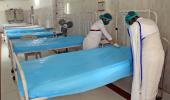Most feel as the movement of people normalises, the in-patient volumes in hospitals will grow and by the end of May, occupancy should be around 50 per cent, and 75 per cent over a period of time.

With revenues dwindling during the lockdown, private hospital chains are now gearing up to return to business as usual as the country gets ready to “live” with new coronavirus.
Most feel as the movement of people normalises, the in-patient volumes will grow and by the end of May, occupancy should be around 50 per cent, and 75 per cent over a period of time.
Another pillar of the post-lockdown strategy is to aggressively test patients who come for even day-care admission. Analysts feel this would not only protect front line healthcare workers from asymptomatic cases but also act as a revenue stream.
Several hospitals had to be sealed in Mumbai (including P D Hinduja, Breach Candy, and Wockhardt) after their staff tested positive for coronavirus.
The share of labs run by private hospitals is growing on the list of those that have permission to test reverse transcription polymerase chain reaction. Permission is given by the Indian Council of Medical Research.
For example, the laboratory services at Indraprastha Apollo Hospitals in Delhi (a public-private hospital) and Shri Ganga Ram Hospital’s clinical lab services in Delhi have received the nod from the ICMR.
Similarly, the laboratories at Zydus Hospital in Ahmedabad; HN Reliance, Kokilaben Dhirubhai Ambani Hospital, PD Hinduja Hospital, and Nanavati Hospital in Mumbai; and Apollo Gleneagles and Emami Group-run AMRI Hospitals in Kolkata are among those that have received the nod from the country’s apex health research body.
This is critical, say hospitals, in treating patients and protecting their staff.
Ashutosh Raghuvanshi, managing director and chief executive officer of Fortis Healthcare, India’s second-largest private hospital chain, said: “In the new ‘normal’ we have to assume that every patient is potentially infected and because of that we have to create capacities. On the diagnostics side, we have the capacities.”
Fortis-owned SRL Diagnostics has been testing Covid-19 patients from the beginning when private laboratories got into it.
Alok Roy, chairman of the Medica Group of Hospitals, which runs hospitals in West Bengal, Odisha, Jharkhand, and Bihar, said the group had approached the ICMR for approval to test in its laboratory.
Does he see this as a steady revenue stream as analysts seem to suggest? Roy said the idea was to do the tests for cost in addition to a 10 per cent margin.
“I do not see this as a significant revenue stream because we need to also test our doctors and staff periodically. The revenue we make would be lost in internal testing,” Roy said.
Meanwhile, the cost of testing would be lower for private hospitals because the reduced collection cost. Industry insiders say for a hospital the cost of testing per patient on PCR will be not more than Rs 2,500.
Reports, however, suggest overcharging by many hospitals, including Mumbai’s Nanavati Hospital, which has now come under the Brihanmumbai Municipal Corporation’s observation after several complaints related to inflated bills.
Industry insiders point out that hospitals are using the “other” clause to test asymptomatic patients when they fill up the ICMR’s V9 form, which lists the categories of patients who can be tested.
Out-patient departments are slowly coming back to life.
The Apollo group of hospitals is planning to resume tertiary and secondary operations from Monday. As the lockdown is lifted, the hospital is hoping to achieve 75 per cent occupancy.
“We are opening up fully... We will take all safety precautions as in any case we expect only a gradual scale-up over the next month,” Akhilesh Krishnan, chief financial officer, Apollo Hospitals, said.
The number of patient numbers too is growing. From 100 patients per day, Medica is getting 180-200 in the past seven week since it opened its OPD.
“By the end of May our in-patient occupancy will reach 50 per cent and by the end of June it aims to touch the pre-Covid levels,” Roy claimed.
Some hospital chains, however, caution about a gradual revival.
Raghuvanshi says hospitals need to create physical barriers, increase the distance between people and between beds, and have a rotational duty roster. Using personal protective equipment and such processes would restrict the number of patients who could be serviced at the hospital, he said.
Analysts feel the same say.
“Business as usual for hospitals may be a distant scenario... we believe procedure pipelines are likely to remain dry through H1FY21 and earnings will remain subdued through FY21,” said Ankit Hatalkar of Edelweiss.
At the other end of the spectrum, smaller hospitals are scrambling to get government approval to start their Covid-19 wards.
Delhi-based Akaash Healthcare wants a dedicated 40-bed floor and is waiting for an inspection before it is allowed to undertake testing Covid-19 patients.
“The floor we have created has separate air-conditioning and all the other precautions have been taken,” said Aashish Chaudhry, managing director of Aakash Healthcare Super Speciality Hospital.












 © 2025
© 2025